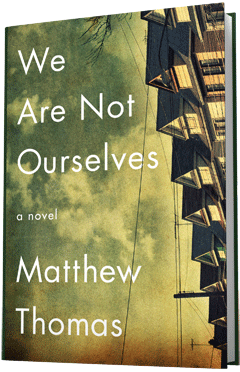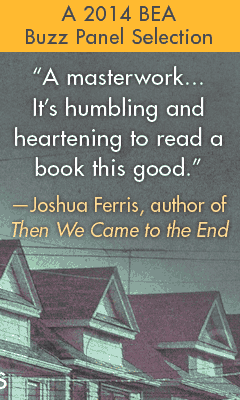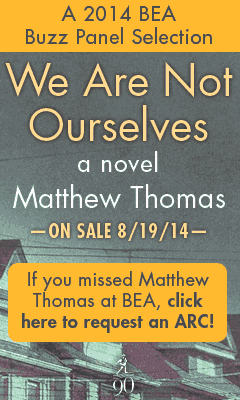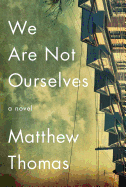We Are Not Ourselves
by Matthew Thomas
In Act 2 of King Lear, the king is talking to the Earl of Gloucester, saying infirmity affects all of us, high and low: "We are not ourselves/ When nature, being oppress'd, commands the mind/ To suffer with the body." This is one of the epigraphs Matthew Thomas chooses to set the stage for his magnificent first novel, We Are Not Ourselves. What can mental illness do to a person? How do others deal with it? These are important questions that this enormous book, in size and depth, asks. It's also a masterful portrait of a mother and wife, Eileen, in all her strengths and weaknesses.
It's 1941. Thomas introduces us to the Irish-American Tumulty family of Woodside, Queens, New York: Mike--or "Big Mike"--his wife and their daughter, Eileen. They live in a four-story building with a sylvan, tree-filled cemetery on one side, the elevated 7 train and the city on the other: "The asphalt, clapboard, and brick breathing with life and the dead holding sway over the grass." The three of them sleep in twin beds in a room that "resembled an army barracks." Mike, who has a "terrible charisma," is a hard worker and part-time bartender who loves his beer and whisky. When he's been drinking he isn't especially violent, though he could be ornery and sullen. Eileen wants to do anything she can "throw her restless limbs into with abandon." Instead, she has to take Irish dancing lessons, arms tight to her side.
In 1952 her mother loses a baby. Physically, it nearly kills her. When she comes home from the hospital, she begins drinking, soon heavily. Older now, Eileen goes to nursing school in Brooklyn. By 1965 she's in a master's program in nursing administration at NYU and begins to look forward "to the day when she would take another man's name." That would be Ed Leary. He's in graduate school, a scientist. Her heart "kicked once like an engine turning over on a wintry afternoon" when she meets him. Besides, he "could dance like a dream." He was as Irish "as anything, but she decided she could marry him"--Eileen aspires to a bigger world than she's in, and Ed will provide the means.
In 1967, now married, Ed and Eileen move into the second floor of a three-family apartment in Jackson Heights. She's thrilled that part "of the dream she'd conceived for her existence had been fulfilled." But she knows there's more to come; that little restless girl is now a restless woman. Ed is a brilliant neuroscience researcher and Eileen sees big things to come in his life--and hers--but he turns down a great research opportunity to teach science at Bronx Community College. Eileen isn't pleased but deals with it. At 31, she wants a family, and when pregnant, a "new lightness entered her spirit." She has a boy, naming him Connell. She "would breathe his baby smell and wonder how she could ever have lived without it." This part she was going to enjoy: "She was going to fill up her heart with it enough for years."
In 1981 she loses her mother to cancer; her father dies two weeks later. Ed has the opportunity to become dean at his college but turns it down--teaching in the classroom is too important. Eileen is infuriated--this wasn't part of her plan. When the house they're living in goes up for sale, they buy it and move downstairs. Ed is 50, and thinks he needs to relax more--"I've earned a rest." He starts to lose interest in teaching, and even cancels a class--formerly unthinkable.
Their neighborhood is changing. When they moved in, it was Irish, Italian, Jewish and they knew everyone on the block. Now it's Colombians, Koreans, Pakistanis. Most of the stores Eileen loved are gone. Ed is changing, too--he's been behaving strangely, and Connell asks if his father is unhappy. No, of course not, he's happy, Eileen assures him, he's just getting older. When Connell is 14, Eileen suggests he sit in on one of Ed's classes, to see what college is like. It doesn't go well--Ed stands in front of the class as if he is talking to no one, going on and on. Hands go up. He ignores them, lectures further. "Dad!" Connell yells, "Dad!" Ed stops, asks a student where they left off, then just cancels the class. "You seemed confused," Connell says. Ed replies that he's just tired.
Now the book begins to slowly spiral downward. Eileen thinks Ed is depressed; they're in a rut. Maybe a move to another house would make all the difference. Eileen finally gets the house she always wanted but Connell begins getting into trouble and Ed's personality is deteriorating. Eileen ignores them as things fall apart.
It's now that the brilliance of this powerful novel manifests itself. As readers we see the telltale signs of Ed's descent into darkness, and its effect on him and the family is poignant, powerful and brilliant--writing at its best. Watching what they go through emotionally--"When nature, being oppress'd, commands the mind/ to suffer"--is almost too hard to bear. But Thomas presents it beautifully, filling tragedy with love and affection. Without a doubt, this expansive, heartfelt novel will provide a fulfilling and rewarding experience for any reader. --Tom Lavoie








_Beowulf_Sheenan_Not_Final_lo_res.jpeg)